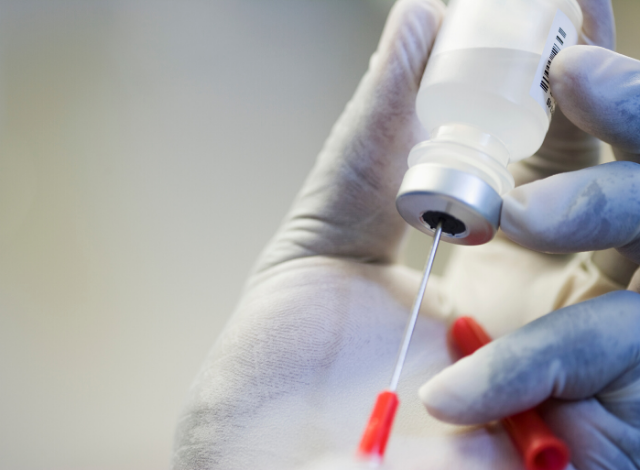The Human Papillomavirus (HPV) Vaccine Provides Protection Against Several Cancers
If you didn’t get the HPV vaccine when you were in school, it may not be too late to get vaccinated and take advantage of the protection it offers.What is HPV?
The Human Papilloma Virus (HPV) is very common. There are around 100 strains, of which approximately 40 can be transmitted during all types of sexual activities (genital, oral, or anal). It is estimated that up to 75% of sexually active people will contract at least one HPV infection at some point in their lives.
Most HPV infections cause no symptoms and heal on their own. However, as this process can take several years, an infected person may unknowingly pass the virus on to their partner(s) in the meantime.
We now know that some types of HPV strains carry a low risk of causing cancer, while others carry a high risk.
- Low-risk HPV strains do not increase the risk of cancer, but they can cause genital warts (condyloma) which can be difficult to detect as they are flat, very small or located inside body cavities. It is estimated that 90% of genital warts are caused by HPV types 6 and 11.
- As the name suggests, high-risk HPV strains (e.g., HPV types 16 and 18) are associated with a higher risk of progression to cancer.
Which cancers are related to HPV?
If a high-risk HPV infection persists, it can cause cellular changes that may promote the development of cancer. For example, HPV types 16 and 18 are responsible for:
- 70% of cervical cancer;
- 40% of vulvar and vaginal cancers;
- 40–50% of penile cancer cases;
- 80–90% of anal cancer cases in both men and women;
- 25–35% of throat or mouth cancer cases in both men and women.
HPV in men should not be underestimated
All men can contract HPV, but men who have sex with other men are at greater risk of contracting high-risk HPV.
In men, HPV types 16 and 18 are associated with several cancers, including:
• 92% of anal cancers;
• 63% of penile cancers;
• 89% of throat or mouth cancers.
Types of vaccine against HPV
Two HPV vaccines are available in Canada, each including a different number of HPV strains.
- The 2vHPV vaccine protects against two high-risk HPV strains that cause most cancers (HPV types 16 and 18).
- The 9vHPV vaccine protects against 9 strains of HPV, including high-risk types 16 and 18 and low-risk types 6 and 8 which are associated with genital warts.
HPV vaccination began for girls in 2006 in Canada. Since 2017, all provinces and territories have included HPV vaccination in their recommended childhood immunization schedule. Vaccinating children before they become sexually active reduces their risk of developing cancer or genital warts later in life.
Is it too late to get vaccinated against HPV?
Ideally, the HPV vaccine should be given before the first sexual contact, but it may not be too late to take advantage of the vaccine even if it is administered later in life.
The vaccine may offer protection against strains that you have not yet been exposed to. Even if you have already been exposed to one of the strains included in the vaccine, it is possible that you have not developed natural protection against that particular strain. Without vaccination, you could become infected again. Therefore, if you have not been vaccinated according to the recommended immunization schedule, it may still be appropriate to do so.
Both vaccines are recommended for people aged 9 to 45 in all provinces and territories. Certain adults who were not vaccinated during childhood may be eligible for free HPV vaccination, generally up to the age of 26. Criteria vary from province to province.
Those who do not meet the criteria for free vaccination can still get vaccinated up to the age of 45 if they wish to protect themselves against HPV infections. Private health insurance plans may reimburse part of the cost.
Vaccination schedule, procedure and side effects
Depending on the person’s age and health at the time of the first dose that is given, one, two or three doses of the HPV vaccine will be needed to provide optimal protection. When multiple doses are required, they are administered 24 weeks apart.
The vaccine is generally administered in the muscle on the upper arm. Some people may experience some pain, redness, or swelling at the injection site. A cold compress or numbing cream applied to the injection site or a painkiller such as acetaminophen or ibuprofen can be used to help ease any discomfort.
Some people may experience mild side effects such as headaches or fever after receiving the vaccine. These symptoms usually disappear within a day or two.
Where to get vaccinated against HPV?
Pharmacists across Canada can provide vaccination services, including the HPV vaccine. You can also get vaccinated at a community health centre, a vaccination clinic or your doctor’s office.
If you haven’t received the HPV vaccine yet, it may still be possible to get vaccinated and reduce your risk of developing certain cancers. Make an appointment with your pharmacist to discuss whether the HPV vaccine is still an option for you, and to find out if you need any other vaccines.
The pharmacy services presented in this section are offered by pharmacist owners who are affiliated with Uniprix. The pharmacists are solely responsible for the professional activities carried out during the practice of pharmacy. These services are offered in participating pharmacies only. Certain fees and conditions may apply.
* The information contained herein is provided for informational purposes only and is not intended to provide complete information on the subject matter or to replace the advice of a health professional. This information does not constitute medical consultation, diagnosis or opinion and should not be interpreted as such. Please consult your health care provider if you have any questions about your health, medications or treatment.




